I found it very difficult to understand the concept of digital marketing effectiveness some time ago. That’s because most of the resources I read only focused on how to measure digital marketing effectiveness.
That got me sad. How can one measure what one don’t even understand?
In this article, I explained what effective digital marketing is all about, the difference between it and digital marketing efficiency, how to measure and how to power it up.
So, let’s begin by understanding the concept of effectiveness before bringing in digital marketing.
What Does Effectiveness Mean?
Effectiveness simply means the extent to which the desired result is met. It is the degree to which a person or organization achieves what is set to be achieved.
Being effective implies how consistent or regular one is in terms of hitting the predefined target or objective.
That means you cannot talk about effectiveness if you don’t have an already set target.
Nevertheless, most marketers use the word effectiveness and efficiency interchangeably. That could be because they both work hand-in-hand, but it doesn’t make them the same.
Before we talk about digital marketing effectiveness, let’s understand the difference between effectiveness and efficiency.
What’s The Difference Between Effectiveness and Efficiency?
The difference between effectiveness and efficiency, especially in the business world, is focussing on cost or approach used in reaching a goal.
While being effective implies reaching a target as planned, efficiency is concerned with the cost involved or manner at which the target was reached.
Similarly, being effective entails adequacy in accomplishing a purpose; producing the intended or expected outcome while being efficient refers to a situation where one is functioning in the best possible manner with the least waste of time, effort or other resources.
A general simple explanation is that-effectiveness is about doing the right things, while efficiency is about doing things right.
So, you could be doing the right thing (effective) but not doing it right (efficient).
Here’s a great illustration of being effective and efficient:
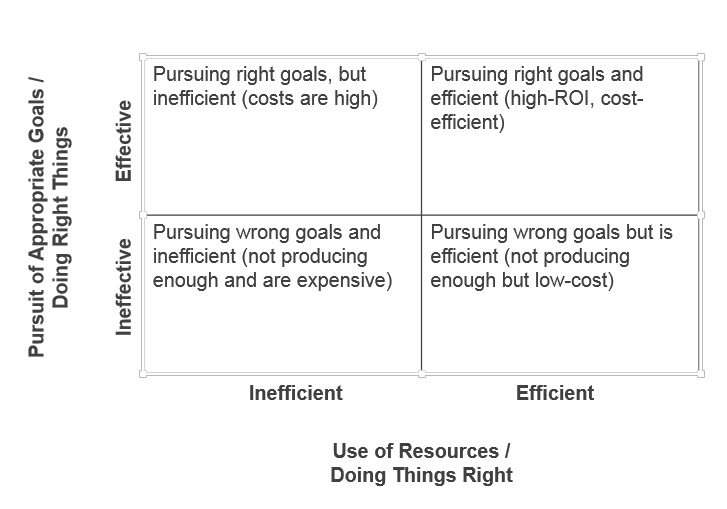
Efficiency and Effectiveness Grid
Image credit: Insights Squared
If you still need to get deeper insights, here is a quick example to understand it better.
A Quick Example On the Difference Between Effectiveness and Efficiency
If a company sets a target for their sales person to sell 200 bags of products in a month and at the end of the month, the 200 bags were all sold.
Wow! That’s effectiveness. Right?
The salesperson has at least hit the target of selling 200 bags in a month. But you know what? You need to ask the question of how, and that’s where efficiency comes in.

Image credit: Pixel
The sales person’s efficiency reflects how the sales were made. If the salesperson sold 200 bags in a month and lost cash worth over half of the sales, it could be said that the salesperson was not efficient in his activities.
But a situation where the salesperson sold all the bags in 20 days at a very lesser cost, can you now notice the difference?
You need to understand something, and that is-
You cannot truly accept marketing effectiveness without considering efficiency and you cannot accept marketing efficiency without considering the effectiveness.
They are like birds of a feather that flocks together.
To buttress this point a bit, Peter F. Drucker, a modern management guru explained the marriage between efficiency and effectiveness in a good way.
“Efficiency is doing better what is already being done. Effectiveness is deciding what to do better.” – Peter F. Drucker
They both tend towards getting a business to her desired state.
So, while looking at effectiveness whether in an offline or online marketing setting, you must consider the manner at which the target is reached together with the question of whether it was reached.
In other words, considering and measuring digital marketing effectiveness requires some elements of efficiency.
In fact, most writers refer efficiency to digital marketing effectiveness. That’s because it is believed that dealing with effectiveness will also cover efficiency.
Before we get started with what digital marketing effectiveness is all about, you need to know what digital marketing implies.
So, quickly run through this article on the definitional guide to digital marketing. It will do you more good before we talk about its effectiveness.
Related: Digital Marketing Definitional Guide to Know it better Now
If you have done that already then let’s move ahead.
What Is Digital Marketing Effectiveness and Efficiency?
Digital marketing effectiveness and efficiency is the extent and manner at which digital marketing goals and objectives are achieved over a specific period of time.
It is a measure of how a business carries out its digital marketing activities, attains increased return on investment (ROI) at a considerable cost.
No doubt, digital marketing efforts are geared toward improving ROI. So the degree and nature of the improvement can be achieved by an effective and efficient approach.
Some Important Questions Asked To Understand The Effectiveness and Efficiency of Digital Marketing.
- What is the performance of my social media campaigns?
- How many followers, shares, and comment did I get a given period?
- How many persons saw and read the content I created?
- How many emails did I send and how many were read instead of being marked as spam?
- How many persons visited my website in a given period of time?
- How many leads were converted via influencers’ efforts?
- How many persons clicked on the link and how many bought
? How much did I spend in reaching my audience and how much did I get in return?
Ah! Sorry I had to stop it there.
There are more questions to consider in digital marketing effectiveness and if split into bits.
Nevertheless, every business is set to achieve certain goals and objectives. It is vital to understand the key performance indicators (KPIs) that are directly related to the business or marketing objectives.
To power up your digital marketing effectiveness, you need to understand how it can be measured.
So How Do You Measure Your Digital Marketing Effectiveness?
Measuring your marketing performance is a key aspect that must not be done haphazardly.
Here are some steps you need to follow:
1. Specify Your Goals
The first step to measure the effectiveness of your digital marketing activities is to make sure your goals are specified.
Before you began carrying out your digital marketing strategies such as social media marketing, search engine optimization (SEO), content marketing, pay per click (PPC); you should have had goals.
Right?
So, the question becomes- where your goals specified and broken down into specific objectives?
To measure your digital marketing efforts and to know if your goals were met, you need to differentiate and relate them appropriately.
A quick rundown of some digital marketing objectives include:
- Increase Brand Awareness
- Increase Traffic
- Improve SEO
- Enhance Brand Reputation
- Increase Customer Satisfaction
- Increase Social Media Community
- Increase lead quality
- Increase sales
- Increase Brand Loyalty
- Enhance Customer Relationship
You need to identify each objective and specify them based on their key performance Indicators (KPIs).
Remember – When your goals are specified, they form part of your objectives. When your objectives are specified, they become easier to measure.
For example, you specify increase sales to be more specific Or SMART.
So, your objective statement can be re-written as- Increase sales by 25% in 30th July 2019.
The difference is clear. This objective statement is more realistic, attainable, measurable and specific.
2. Identify The Most Critical
There are numerous digital marketing objectives you need to measure in order to find out their effectiveness.
The truth is, they are all important but not all are necessary at a time.
To power up your digital marketing effectiveness, you need to identify the ones that are critical or crucial at a specified point in time.
For example, from the list of digital marketing objectives listed above, you could identify specific ones you need and break them down into their KPIs.
So, if improve SEO is among your most important objectives. Then they can be broken down into KPIs such as:
- Page Views
- Bounce Rate
- Time Spent
- Domain authority
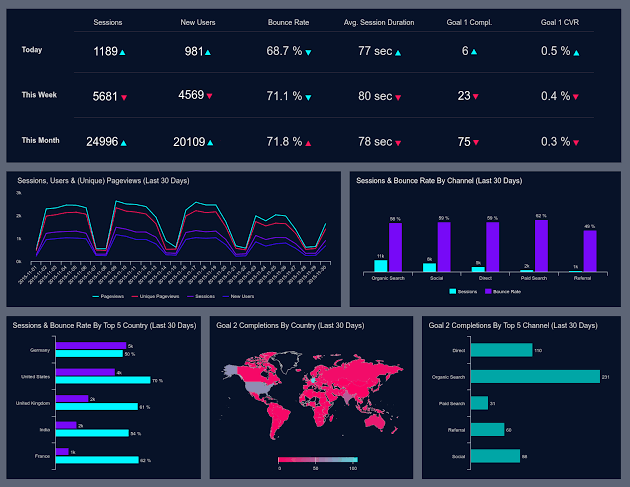
Image Credit: Datapine
So, knowing about these key indicators will aid you in ascertaining how effective your digital marketing efforts are; in terms of improving your search engine optimization.
3. Collect And Analyze Relevant Data
Collection of data these days could be somewhat easier than before due to an increase in tools that can provide key performance metrics (KPMs).
Tools like google console and google analytics can generate powerful data based on your online customers’ behavior.
Take a look at this Google Analytics dashboard below:
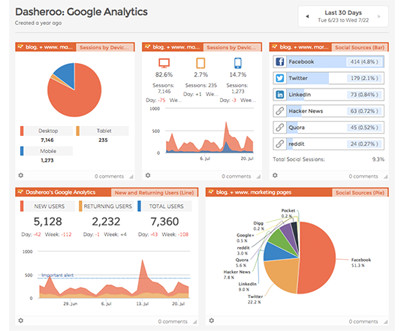
Image credit: Dasheroo
The Google Analytics dashboard reveals several angles one can adopt in evaluating one’s online marketing effectiveness.
To power-up your digital marketing effectiveness, you need to collect relevant data. The relevance here implies collecting the data that you need to answer a specific question.
Don’t waste much time looking out what does not really matter at a point in time.
4. Match Results With Goals
Now you have identified specific objectives, collected the data that meet your pressing need. It’s time to reconcile results with goals.
Matching your digital marketing results with your goals or specific objectives implies checking if those results correspond with what you already have in mind.
Your objectives are like where you what to be or what you what to be. So you need to marry your present result with where you want to be if they correspond.
For example, if your objective is to increase your social media community then you should be asking about how many active followers you have on your social media pages in a specific period of time.
Remember, not just followers, but active followers.
In case you need to get
Related: 12 Proven Ways To Achieve Digital Marketing Efficiency
Related: 35 Digital Marketing Key Performance Indicators (KPIs) You Can’t Afford To Overlook
Final Note
In this article, an effort was made to differentiate between digital marketing effectiveness and efficiency.
To power your digital marketing effectiveness depends on how well you can critically evaluate your KPIs.
Your KPIs can be gotten via an appropriate specification or break down of your goals into specific objectives.
The golden rule here is – All your digital marketing objectives are important but not all are relevant at a point in time.
So, to better understand your digital marketing effectiveness, identify the critical objectives and it’s KPIs. Then match your current results with your specified goals.
Now, over to you. Make sure you put what you have known in practice.
Hit me up if you still run into confusion in trying to power up your digital marketing effectiveness.
I’ll be super happy to hear from you.

Jackson is an obsessed content marketing specialist. A brand storyteller, not a teller of stories. He is passionate about helping online businesses grow with compelling digital marketing strategies. Follow him on Twitter, LinkedIn, and Instagram.
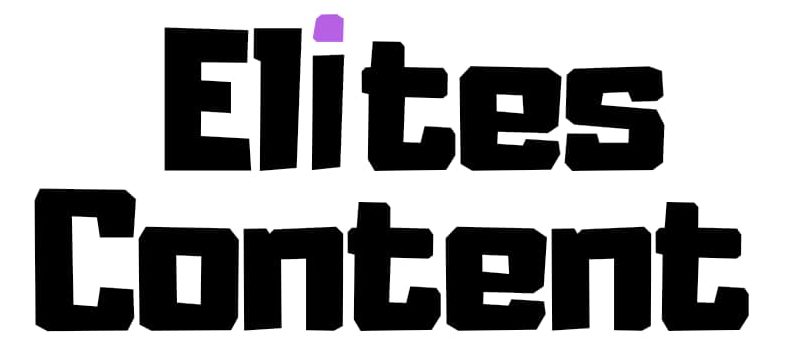
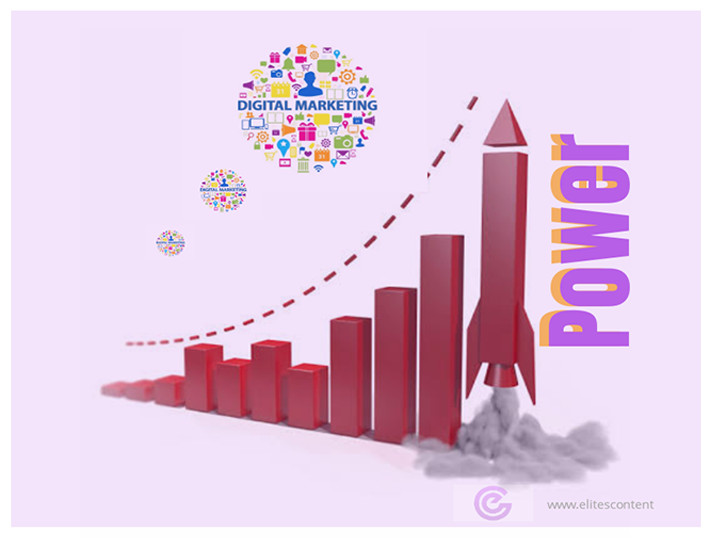

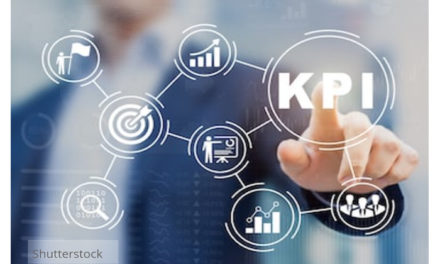


Hey Jackson, Thanks For Sharing That In Simple language That anyone Understand easily…..it’s really helpful for also begginers.
Thank Nishant. AM glad you found it helpful. Expect more coming